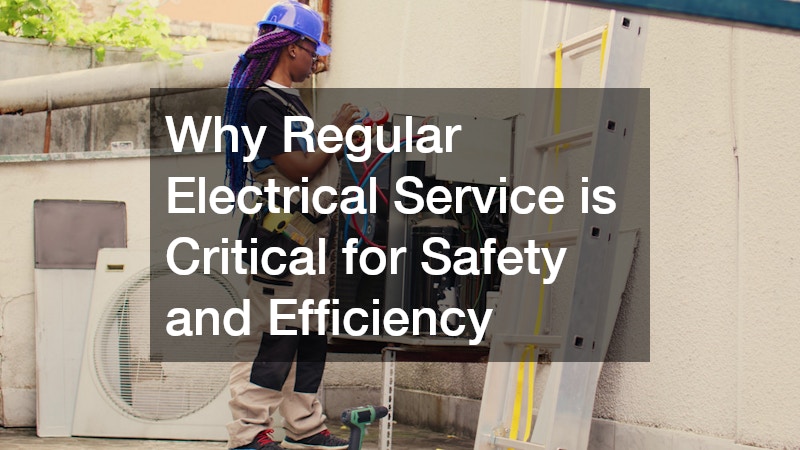Electrical systems are integral to modern life, providing the energy required for lighting, heating, appliances, and more. Regular electrical service is vital to ensure both safety and efficiency, preventing hazards and reducing unnecessary energy consumption. In an era where energy efficiency and safety have become paramount, understanding the importance of routine electrical maintenance offers significant benefits that go beyond immediate utility.
The Importance of Regular Electrical Inspection
Identifying Potential Hazards
Electrical inspections help in identifying frayed wires, overloaded circuits, and other potential safety issues that could lead to electrical fires or shocks. These hazards can linger unnoticed until a significant issue arises, risking both property and human safety. By scheduling regular inspections, homeowners and businesses can proactively manage and mitigate these risks, ensuring that their environments remain safe and secure.
The identification of such hazards is not only critical for immediate safety but also for the long-term integrity of electrical systems. A single overlooked frayed wire might escalate into a catastrophic electronics failure, given the right circumstances. Therefore, early detection is key, and regular inspections act as a safeguard against such latent dangers.
Ensuring Compliance with Standards
Regular inspections ensure that your electrical systems comply with the latest safety standards and regulations, reducing legal liabilities and potential fines. Electrical codes are frequently updated to reflect new safety research, technological advancements, and industry best practices. Failure to comply with these evolving standards could lead to not only legal ramifications but also increased safety risks.
One aspect of these standards includes ensuring that all installations and upgrades are performed by certified professionals. Non-compliance can result in complications when selling a property, as buyers demand proof of compliance to ensure they are purchasing a safe and secure environment. Ensuring compliance through regular inspections avoids these complications and enhances the value of the property.
How Regular Electrical Maintenance Improves Efficiency
Optimizing Energy Use
Electrical maintenance can uncover inefficiencies or outdated components that waste energy, allowing for upgrades that optimize energy usage. Outdated technology often consumes more electricity compared to modern energy-efficient alternatives, resulting in unnecessarily high electric bills. Through routine inspections and maintenance, property owners can identify such inefficiencies and take corrective actions to rectify them.
For example, an old air conditioning system might operate with less efficiency and consume more electricity than a newer, energy-efficient model. By highlighting these inefficiencies in regular inspections, property owners have the opportunity to upgrade to more efficient alternatives that not only reduce energy consumption but also lower utility bills. Moreover, such upgrades are often incentivized by governmental policies aimed at promoting energy efficiency, further reducing the cost burden on owners.
Extending Equipment Lifespan
Regular servicing can prevent wear and tear on electrical components, extending the lifespan of your equipment and reducing the need for costly replacements. Electrical systems, like any infrastructure, are subject to degradation over time due to regular use and environmental factors. Routine maintenance serves to alleviate this degradation by ensuring that all components function optimally and within their intended operating conditions.
The economic benefits of extending the lifespan of electrical equipment are evident; maintenance helps avoid premature failures that would lead to costly replacements. For instance, maintaining a building’s electrical infrastructure can postpone significant expenses associated with major overhauls or emergency repairs. This proactive approach is not only cost-effective but also ensures operational continuity without unforeseen disruptions or downtimes.
Common Signs That Indicate Electrical Services Are Needed
Frequent Circuit Breaker Trips
If your circuit breakers trip frequently, it could indicate an overloaded system or faulty wiring that needs attention. Frequent tripping is often a sign that the electrical system is being subjected to more demand than it can handle safely. This could occur due to an increase in appliance use or the addition of high-energy equipment that overwhelms the current system capabilities.
Addressing frequent breaker trips requires a thorough inspection to determine the underlying cause, which may be linked to outdated wiring or inadequate circuit design. Professional electricians can evaluate the load distribution and recommend reconfigurations or upgrades to accommodate additional capacity demands. By addressing this issue, properties can maintain stable electrical service without undue interruptions.
Flickering or Dimming Lights
Flickering or dimming lights may suggest a circuit issue or an incompatible fixture that requires professional assessment. Inconsistent lighting can be an indication of fluctuating electrical current levels that need to be monitored closely. Such fluctuations may stem from faulty wiring, aging systems, or the presence of incompatible appliances straining the circuit.
Professional electricians can diagnose the cause of the flickering lights and suggest solutions such as circuit enhancements or replacement of problematic components. In some cases, flickering lights may indicate a bigger underlying electrical problem, which, if not addressed promptly, could escalate into larger safety and efficiency concerns. Regular attention and maintenance to rectify this can subsequently prevent damage to electrical fixtures and ensure lighting systems remain effective and reliable.
Regular electrical service is a critical component in ensuring both safety and operational efficiency in any setting that relies on electricity. By preventing hazards, ensuring compliance, improving energy efficiency, and extending the lifespan of electrical systems, regular maintenance is an investment in safety and sustainability. Homeowners and businesses alike benefit from the cost savings, liability reduction, and peace of mind that come from well-maintained electrical systems. As the demands on electrical systems grow with advancing technology, assessing and maintaining these systems becomes increasingly important for both environmental and financial contributions.


